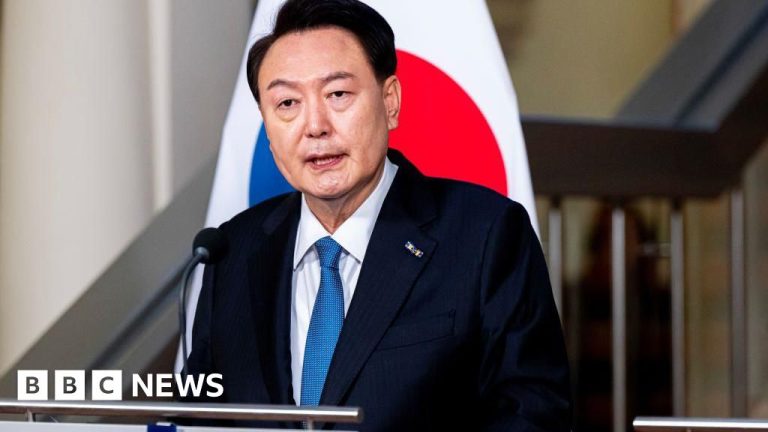Getty Images
Yoon Suk Yeol has not spoken publicly since martial law was revoked Wednesday morning
South Korea's major parties are holding emergency meetings amid reports that lawmakers may propose a vote to impeach President Yoon Suk Yeol following the brief declaration of martial law Tuesday night.
The main opposition Democratic Party said the vote, currently scheduled for Saturday, could take place as soon as it can secure the number of votes in favor of passing the motion.
In the first clear sign that his own party could now vote with the opposition, the leader of Yoon's ruling party called on Friday for his swift suspension, saying he posed a “great danger” if he remained in power.
The opposition needs the support of at least eight ruling party MPs to obtain the 200 votes required for the impeachment motion to pass.
Han Doong-hoon, head of the People Power Party (PPP), earlier said his party would not support the opposition's impeachment motion.
But on Friday he said there was “credible evidence” that Yoon had ordered the arrest of key political figures on “anti-state charges” on Tuesday.
He expressed concern that “extreme actions”, such as declaring martial law, could be repeated if Yoon remains in power.
“These pose great risks to the Republic of Korea and its people.”
He added that his party had learned of a plan to incarcerate arrested opposition politicians at a detention center in Gwacheon, a city south of Seoul.
His comments are the first clear indication that the president's own party may now vote to help impeach him.
Earlier on Friday, opposition supporters gathered on the steps of Parliament, armed with placards and demanding the president's impeachment.
Yoon's attempt to impose martial law shocked the country and angered South Korea's allies and financial markets.
He cited threats from “anti-state forces” and North Korea. But it soon became clear that his decision had not been motivated by external threats but by his own domestic political problems.
The order was abruptly reversed hours later after 190 MPs managed to enter Parliament and vote against the bill – some of them scaling fences and breaking barricades to enter the chamber.
Opposition MPs fear a new attempt to impose martial law. Some of them told the BBC earlier that they had stayed close to the National Assembly grounds so that they could get there quickly to vote against such a declaration.
Special forces commander Kwak Jong-guen assured Parliament on Friday that he would refuse to follow such an order if martial law was declared again.
Kwak said he rejected orders to remove lawmakers from the assembly as they gathered to vote against declaring martial law on Wednesday morning.
“I ordered the soldiers not to enter the compound…I ordered that no live bullets be distributed (and) no harm be caused to civilians,” he said .
BBC/Nick Marsh
Earlier on Friday, opposition supporters gathered on the steps of Parliament to demand the president's impeachment.
Meanwhile, ruling party lawmaker Cho Kyung-tae became the first ruling party lawmaker to publicly express support for Yoon's impeachment.
“The choice between standing with the people in suspending the office of president or becoming an ally of the forces that imposed martial law is a question for politicians to judge,” Cho said Friday.
“I hope that all People Power politicians will stand with the people,” he added.
The capital, Seoul, saw more than two days of street protests demanding Yoon's resignation, while police said he was under investigation for “insurrection.”
People also flooded PPP lawmakers with text messages, urging them to vote for Yoon's impeachment, according to South Korean media.
One lawmaker, Shin Sung-bum, received more than 4,000 such messages on Facebook, Chosun Daily reported.
More than seven in 10 South Koreans favored impeachment, a survey by local pollster Realmeter showed Thursday.
Yoon has not been seen or spoken publicly since rescinding the martial law order Wednesday morning. A survey conducted from Tuesday to Thursday this week showed his approval rating had fallen to a record low of 13%.
Before his attempt to place the country under military rule, the president had already faced low popularity, allegations of corruption and an opposition-led legislature that reduced him to the status of a lame-duck leader.
Additional reporting by Hosu Lee in Seoul and Fan Wang in Singapore

